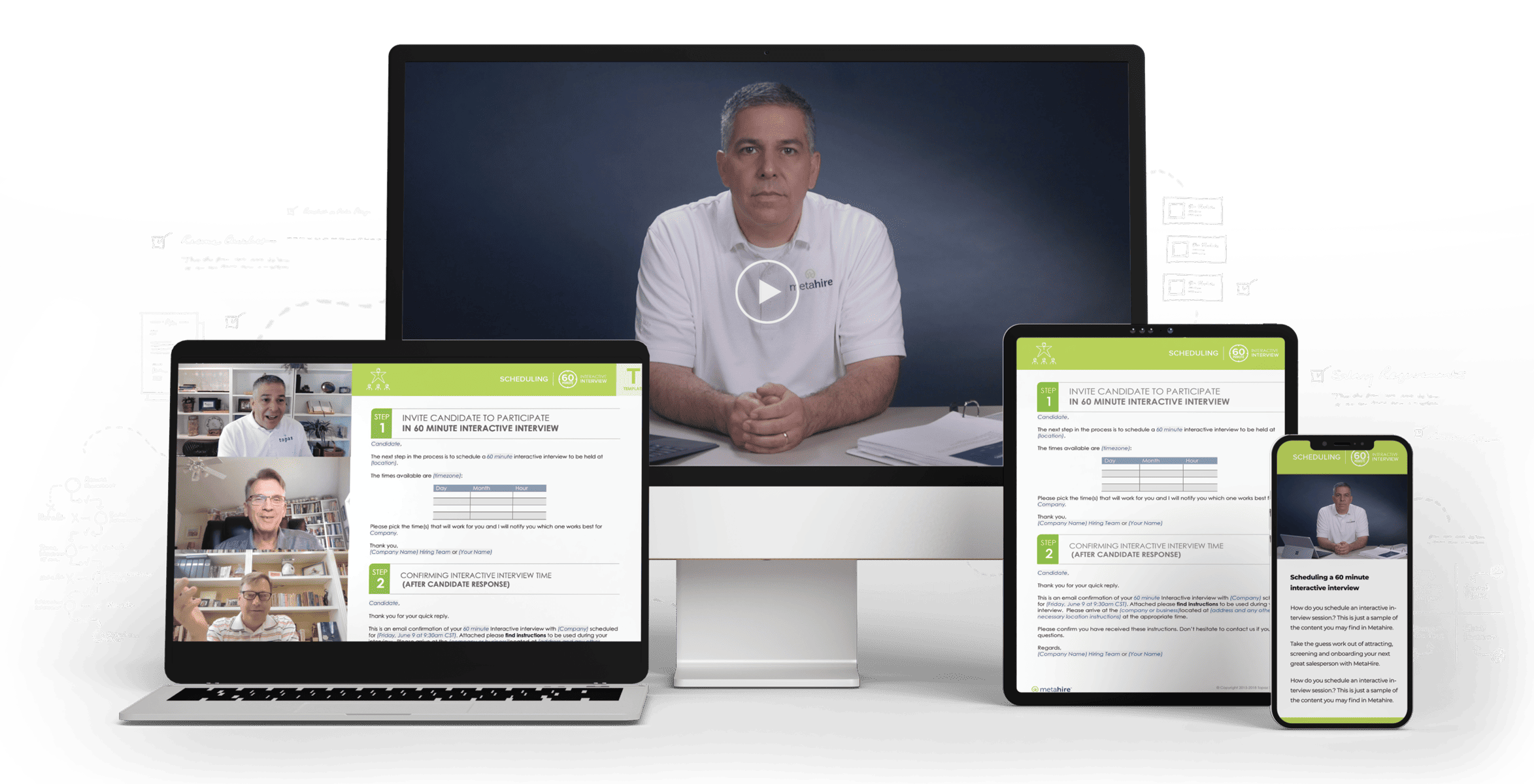Because Sales Is Just Like Any Other Department, isn’t it?
Why would anyone need a unique process for hiring salespeople? Sales is just like any other department in the organization, after all. The same interview questions and hiring approach should work just fine…right?
It’s not like sales is a high-stakes role with ambitious targets or that salespeople need specialized skills to thrive. Surely, your existing process to hire for various other roles in your organization will bring in perfect candidates every time — no extra steps required!
So, if you think a dedicated sales hiring process isn’t necessary, let’s explore 8 reasons why you might be “totally right.”
1. You Never Experience Turnover in Sales
Salespeople stay with you for life, right?
Once they’re in, they’re here to stay, building lifelong customer relationships and never dreaming of other opportunities. Why would you ever need to worry about turnover? After all, salespeople are famously known for stability in one role, never looking for new challenges or better offers.
And let’s not even consider how high turnover might impact your sales pipeline or team morale. Since this never happens, there’s no need to design a process that carefully selects candidates with long-term potential.
Let’s get real: Turnover in sales is a real challenge, often resulting from mismatches in role fit or unmet expectations. A dedicated skills-based sales hiring process helps identify candidates with the skills needed to succeed. They’re more likely to stick around, reducing turnover and building a stronger, more committed team.
2. Every Candidate Has Natural Sales Instincts
What’s the point of introducing a unique sales hiring process when every candidate has the “it factor” for sales?
They all instinctively know how to close deals, handle objections, and build rapport. Surely, anyone can walk into a room, turn on the charm, and easily close the deal. Sales is about charisma only, wouldn’t you say? There is no need to dig deeper into skill sets, potential, or suitability. Just hire anyone who can talk confidently, and they’ll figure the rest out on the fly. No training required — sales instincts will carry them through!
Let’s get real: Sales instincts vary widely, and a confident personality doesn’t necessarily translate into sales success. Some of the most accomplished salespeople we’ve worked with are actually introverted and one of the quietest people in a room.
Imagine hiring someone who seems like a natural but, when faced with an actual sales call, breezes right past the client’s real needs just to “tell”. They’re so focused on “selling” that they miss cues, fail to ask the right questions, and push a solution that doesn’t fit. A strong sales hiring process can help spot these red flags early, identifying candidates who combine communication skills with true adaptability and empathy for clients.
3. All Salespeople Thrive Under the Same Conditions
Why would anyone need to tailor the hiring process to assess different strengths or work styles? Every salesperson thrives in the same type of environment, after all. No need to consider how they might handle challenges or whether they’ll fit into your company’s unique sales culture. Just plug them into any role and watch them go!
Let’s get real: The reality is, each salesperson has unique strengths, motivations, and ways of working. A solid sales hiring process helps identify how well a candidate aligns with your specific environment and demands. Here’s why a tailored approach is essential:
- Match work style with sales cycle: Some candidates excel in fast-paced, transactional sales, while others thrive in relationship-based roles with longer sales cycles.
- Adaptability to team culture: Every team operates differently, and aligning personalities and work styles with the team’s culture helps build cohesion and drive.
- Identify motivation drivers: Understanding what motivates each candidate can improve performance and retention.
- Assess ability to handle pressure: Not every salesperson is cut out for high-stress, high-target roles, so it’s essential to identify those who can excel under pressure.
Read our blog: 7 Reasons You Don’t Need Sales Training
4. Your Gut Instinct Is Always Right
When hiring sales talent, why bother with assessments or structured interviews when you’ve got gut instinct on your side? Just trust your intuition; you’ll employ winners every time, right? After all, it only takes a handshake and a quick chat to tell if someone’s got what it takes. Forget about skills assessments, background checks, or even asking about past performance—your gut knows best.
Let’s get real: Relying solely on gut instinct can lead to costly mistakes. A structured hiring process, including assessments, skills evaluations, and behavioral interviews, helps reveal potential and uncover any red flags. Here’s why taking a systematic approach beats going with your gut:
- Reduces bias by focusing on objective criteria over first impressions.
- Identifies key sales competencies that a quick conversation might miss.
- Ensures consistency in evaluating each candidate fairly.
- Protects against mis-hires by adding layers of insight and validation.
5. Sales Quotas? They’re Not Stressful at All!
Sales quotas, monthly targets, and performance reviews are no big deal. Anyone you hire should naturally thrive in high-stress environments without breaking a sweat. After all, handling rejection, navigating tough conversations, and staying motivated through long sales cycles comes easily to everyone… doesn’t it?
Let’s get real: Sales can be one of the most pressure-filled professions, and not everyone can handle the unique demands it brings. A structured hiring process allows you to identify candidates who show intangible sales competencies like resilience, adaptability, and mental toughness — the qualities that help them stay focused and productive under pressure. By assessing a candidate’s ability to handle stress and maintain motivation, you’ll find those who can meet quotas consistently and are less likely to burn out or falter in a high-stakes sales role.
6. Salespeople Are Always Self-Motivated
Why would you need to assess a candidate’s drive or motivation in the hiring process? All salespeople are naturally self-starters who push themselves to hit targets without extra encouragement. Forget about hiring people with a proven track record of self-discipline or resilience — just trust that they’ll be fired up on their own every day!
Let’s get real: Sales is one of the few roles where self-motivation is critical. A thorough sales hiring process helps identify those with genuine drive and a proactive attitude. These people take ownership of their goals, follow through on leads, and don’t rely on constant oversight to perform — particularly important for remote sales roles where management doesn’t have as much control over their team’s day-to-day. Without assessing motivation levels, you’re left hoping that new hires will push themselves…but the reality might look very different.
7. The Same Questions Work for Every Role
When it comes to interviews, why complicate things with role-specific questions?
Just ask every candidate the same handful of standard questions, and you’ll get all the insights you need. There’s no need to dig into their approach to prospecting, follow-up techniques, or how they handle rejection. Any candidate can answer questions like, “Tell me about a time you worked on a team” or “What’s your biggest weakness?” and prove they’re a good fit for sales, right?
A generic interview is undoubtedly more straightforward — no need to think up any specific scenarios to understand how they’d handle a client objection or navigate a tough negotiation. No need to assess their critical thinking or problem-solving skills in a real sales context. After all, selling is like any other role, so why add more questions just for sales candidates?
Let’s get real: Sales demands a particular skill set, and a one-size-fits-all interview process can’t and won’t uncover a candidate’s true sales potential. Tailored questions can reveal a candidate’s approach to real sales challenges, ability to adapt, and how they show resilience in the face of rejection. Instead of generic questions, structured sales interviews dig into critical areas like:
- Prospecting: Does the candidate have a strategic approach to identifying new leads, or do they rely on generic outreach?
- Handling objections: How do they respond when a client isn’t convinced? Do they back down, or can they turn objections into opportunities?
- Time management and prioritization: Sales is fast-paced and goal-driven. Does the candidate know how to juggle multiple deals and deadlines?
A specialized approach helps you understand if a candidate has the tactical skills, creativity, and resilience needed to thrive in a high-stakes sales environment. That’s how you build a winning sales team.
8. Sales Reps Don’t Need to Adapt — They Already Know Everything
The sales environment never changes, right? Markets are predictable, customer needs never evolve, and products stay the same. Why bother assessing a candidate’s ability to adapt or learn new things? Just hire someone who’s mastered one way of doing things, and they’ll be all set, no matter what changes lie ahead.
Let’s get real: Adaptability and learning agility are must-haves in sales, especially when everything from technology to buyer behavior evolves constantly. An effective hiring process screens for these traits, asking candidates about times they’ve had to switch up their approach or learn a new strategy.
Picture hiring someone who thrived in a completely different market but struggles as soon as they face new buyer expectations, products, or competitors. A candidate might seem great in the interview but fall behind when asked to pivot or adapt their approach. If your hiring process doesn’t look for adaptability, you could end up with a team skilled in outdated tactics and struggling to keep up with new demands.
Hiring for agility and adaptability ensures your team is resilient and can shift gears when the unexpected happens. After all, the best salespeople aren’t those who know everything but those who are quick to learn, adjust, and apply new knowledge to their approach.
Why Sales Hiring Deserves a Unique Approach
You might have picked up on a bit of sarcasm throughout this article, and here’s why: we hear objections all the time about why businesses “don’t need” a specific process to hire sales talent.
However, in our experience, organizations transform when they finally embrace the reality that sales hiring is different and requires a different set of strategies. When companies implement a structured approach to hiring sales talent that identifies unique qualities like resilience, self-motivation, and strategic thinking, they see game-changing results.
Sales roles come with unique pressures and challenges, and a strong sales hiring process doesn’t just find someone who can talk the talk. It identifies candidates who can thrive in a fast-paced, competitive environment and genuinely connect with customers. So, if you’ve been relying on a generic hiring approach, it might be time to think differently. Embracing a process built for sales can help you create a stronger, more consistent team that drives impressive and meaningful results.
Ready to elevate the quality of your sales hiring process? We’re here to help.
FAQs
1. Why is a dedicated hiring process important for sales roles?
A dedicated sales hiring process helps identify candidates who possess the specific skills, resilience, and motivation needed to succeed in a sales role. This process reduces turnover, enhances team cohesion, and ensures candidates align with the demands and culture of a sales team.
2. What qualities should I look for when hiring for a sales position?
Look for qualities like resilience, adaptability, coachability, communication skills, active listening, and self-motivation. A strong candidate should also demonstrate a good balance between relationship-building and goal orientation, with a clear understanding of handling objections and adapting to different clients.
3. How can structured interviews improve the sales hiring process?
Structured interviews with a scoring process help assess candidates consistently by focusing on relevant competencies rather than subjective impressions. By asking specific, sales-focused questions, you gain insight into a candidate’s experience with prospecting, overcoming objections, and managing stress, making it easier to identify top talent.
4. Should I prioritize experience or potential in sales hiring?
While experience is valuable, potential can be equally important, especially if a candidate shows a willingness to learn, adaptability, and strong interpersonal skills. Hiring candidates who fit your company’s values and goals is often beneficial, as skills can be developed through training.
5. What role does culture fit play in sales hiring?
Culture fit is critical in sales hiring because it influences engagement, job satisfaction, and team collaboration. A salesperson who aligns with your company’s culture is more likely to be motivated, perform well, and contribute positively to the team’s dynamics.
6. How can assessments help in hiring sales professionals?
Assessments can help gauge candidates’ skills, sales aptitude, and behavioral traits, providing a more complete picture of their potential. They are useful in identifying strengths, weaknesses, and the likelihood of long-term success, helping reduce turnover and improve hiring accuracy.







